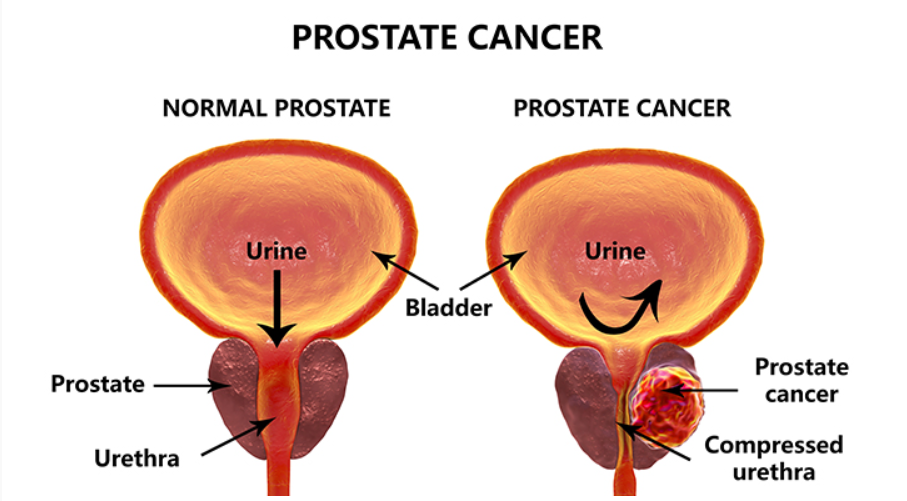In the realm of oncology, cancer awareness and knowledge play pivotal roles in early detection and effective management. Prostate cancer symptoms are one of the most prevalent forms of cancer among men, and understanding its signs, symptoms, causes, and risk factors is crucial for both prevention and early intervention. In this article, we will delve into the intricate details of prostate cancer to empower you with valuable insights. For a more in-depth exploration, be sure to check out the YouTube videos on prostate cancer available on Onco Views, an initiative by Dr. Unni S. Pillai, dedicated to spreading cancer awareness.
prostate cancer symptoms
Prostate cancer often begins quietly, without any noticeable symptoms during its early stages. However, as the disease progresses, it can manifest a range of signs and symptoms, which may include:
- Urinary Changes: Men may experience difficulties in urination, such as increased frequency, weak urine flow, or a sense of incomplete emptying of the bladder.
- Blood in Urine or Semen: Presence of blood in the urine or semen can be an alarming sign, necessitating immediate medical attention.
- Erectile Dysfunction: Prostate cancer may lead to difficulties in achieving or maintaining an erection, although it can also be caused by various other factors.
- Pelvic Discomfort: Persistent pain or discomfort in the pelvic area, lower back, or hips should not be ignored, as it may indicate advanced stages of the disease.
- Bone Pain: When prostate cancer spreads to the bones, it can result in bone pain, fractures, or weakness.
It’s important to note that these symptoms can also be associated with other benign conditions, so a thorough evaluation by a healthcare professional is essential for an accurate diagnosis.

Causes of Prostate Cancer
The exact cause of prostate cancer remains unclear, but several risk factors have been identified that can increase the likelihood of developing this disease. These include:
- Age: Prostate cancer is more common in older men, with the majority of cases occurring in those over the age of 65.
- Family History: A family history of prostate cancer can elevate an individual’s risk, particularly if close relatives (such as a father or brother) have been diagnosed.
- Race and Ethnicity: African American men have a higher incidence of prostate cancer compared to men of other racial and ethnic backgrounds. It tends to be more aggressive in this group as well.
- Genetics: Certain inherited gene mutations, may increase the risk of developing prostate cancer.
- Diet and Lifestyle: A diet rich in high-fat foods and low in fruits and vegetables may contribute to an elevated risk. Additionally, obesity and lack of physical activity have been associated with a higher likelihood of prostate cancer.
- Geographic Location: The prevalence of prostate cancer varies by geographic region, with higher rates observed in North America, Europe, and Australia.
Risk Factors
While age, family history, and genetics are non-modifiable risk factors, there are steps individuals can take to reduce their risk of prostate cancer:
- Dietary Choices: Adopting a balanced diet that includes plenty of fruits, vegetables, and foods rich in antioxidants may help reduce the risk.
- Regular Exercise: Engaging in regular physical activity can contribute to overall health and may lower the risk of prostate cancer.
- Screening and Early Detection: Routine prostate-specific antigen (PSA) testing and digital rectal exams (DREs) can aid in early detection when the cancer is most treatable.
- Healthy Lifestyle: Maintaining a healthy weight, not smoking, and moderating alcohol consumption can all play a role in reducing cancer risk.
Conclusion
Prostate cancer is a significant health concern for men, and understanding its signs, symptoms, causes, and risk factors is essential for early detection and effective management. Regular screenings and a healthy lifestyle are key components of reducing the risk and ensuring favorable outcomes in the event of a diagnosis.
For more comprehensive information on prostate cancer, be sure to explore the educational YouTube videos available on Onco Views, an initiative by Dr. Unni S. Pillai, committed to raising cancer awareness and empowering individuals with knowledge for a brighter and healthier future. Together, we can make a difference in the fight against cancer.

